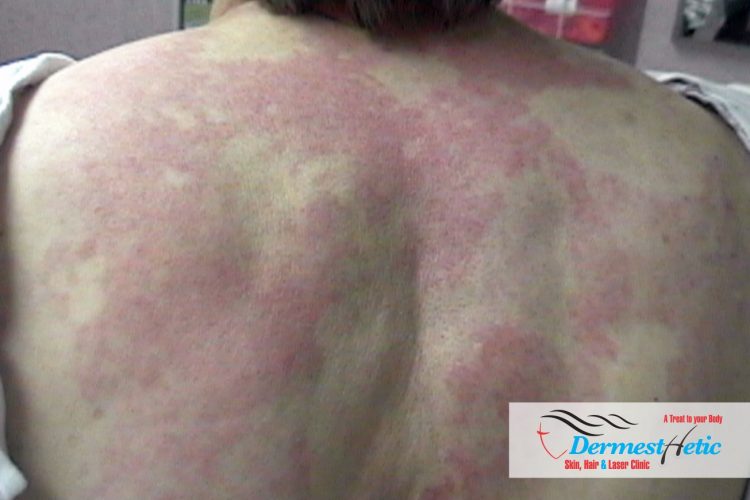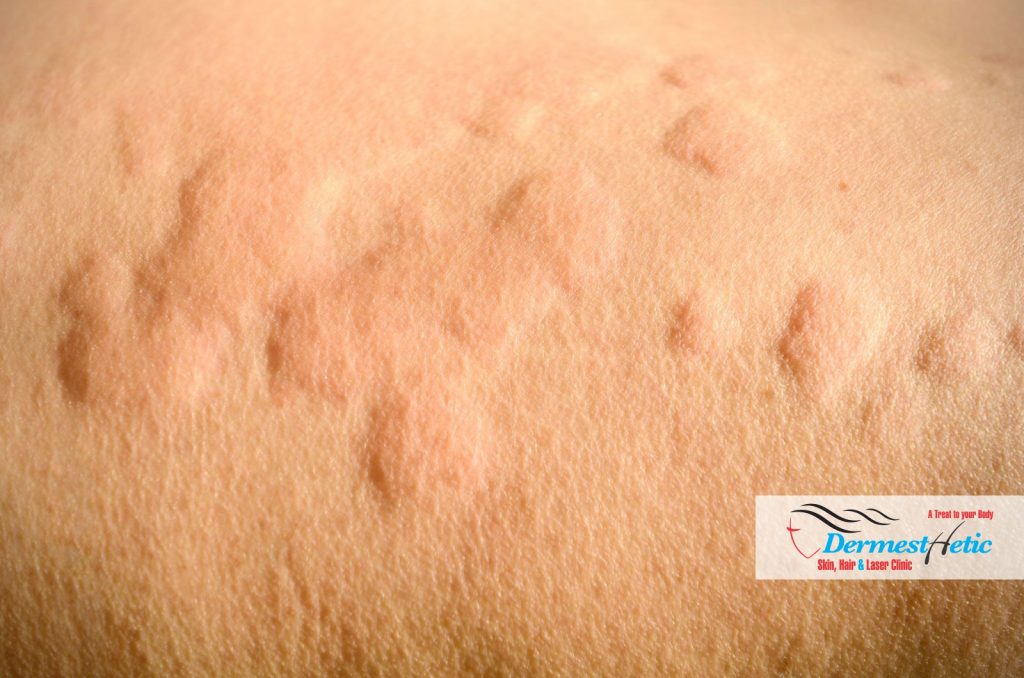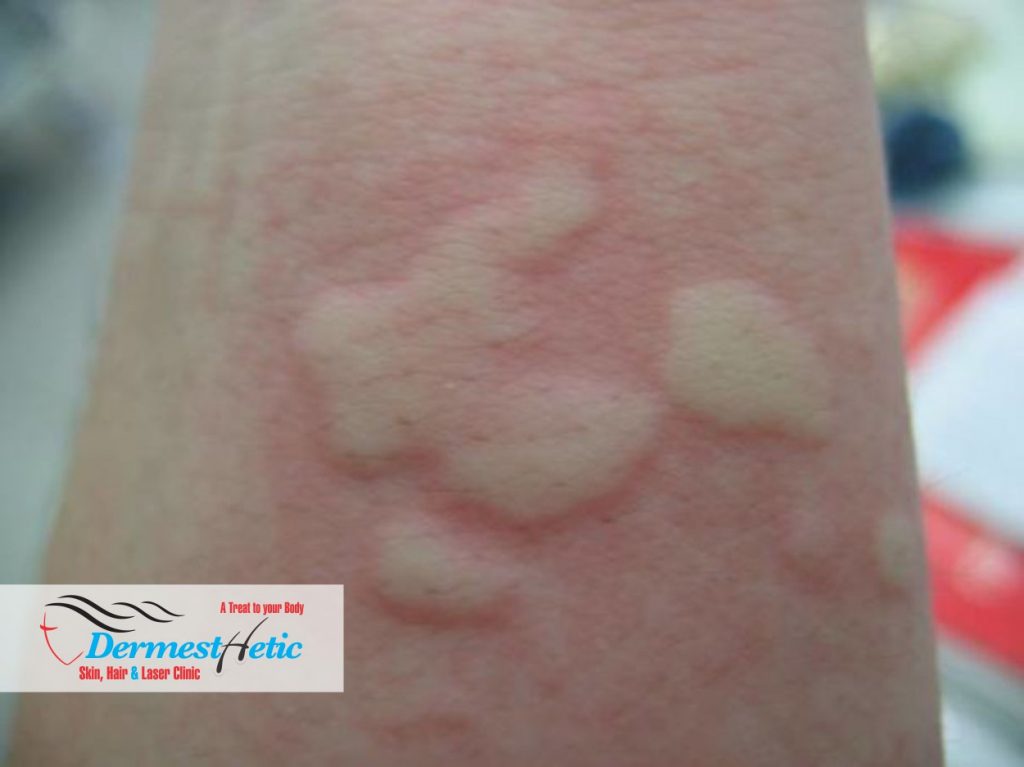Urticaria (Hives) are red, itchy welts that result from a skin reaction. The welts vary in size and appear and fade repeatedly as the reaction runs its course. The condition is considered chronic hives if the welts appear for more than six weeks and recur frequently over months or years. Hives (medically known as urticaria) appear on the skin as wheals that are red, very itchy, smoothly elevated areas of skin often with a blanched center. They appear in varying shapes and sizes, from a few millimeters to several centimeters in diameter anywhere on the body. The itch can drive you crazy, but scratching hives may cause them to spread and become even more inflamed. We at DERMESTHETIC Silakot & Lahore, Pakistan have experienced dermatologists and cosmetologists diagnosing and curing these diseases.
Consultation
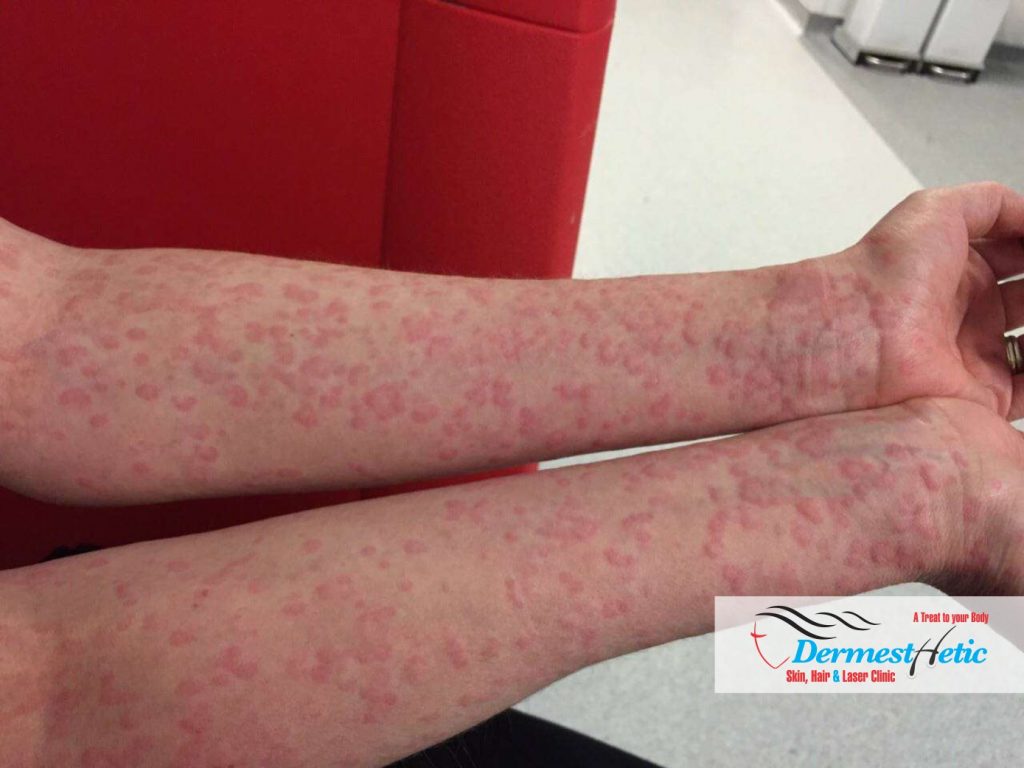
At DERMESTHETIC Silakot & Lahore, Pakistan we are committed to providing patients with the most advanced and authentic treatment of Utricaria in Pakistan. In order to educate our patients in great detail about Utricaria in general, it’s causes, it’s different symptoms and various treatment options available in the world, we provide a detailed information in this portion that the patients can educate themselves in befitting manner regarding their disease. The type of treatment that is best for you will depend on your preference, overall health, age, and where the utricaria appears on your body. Blood tests may also be used to help determine a diagnosis of Urticaria. The majority of testing for Urticaria is done through blood tests.
A cold compress can be used as often as necessary.
- Bathing in an anti-itch solution. Oatmeal and baking soda baths can soothe skin and reduce irritation. …
- Applying aloe vera. The healing properties of aloe vera may soothe and reduce hives. …
- Avoiding irritants.
We at DERMESTHETIC have such expertise and knowledge and you may meet with our doctors who are rated as the BEST SKIN SPECIALISTS AND DERMATOLOGISTS IN LAHORE, PAKISTAN with special expertise in utricaria treatment.
Causes of Urticaria (Hives)
Urticaria occurs when a trigger causes high levels of histamine and other chemical messengers to be released in the skin. These substances cause the blood vessels in the affected area of skin to open up (often resulting in redness or pinkness) and become leaky. Chronic urticaria (hives over 6 weeks) is not dangerous. Sometimes hives occur with angioedema (swelling). Usually, the cause of chronic urticaria cannot be identified. However, acute episodes of urticaria last for six weeks or less. Acute urticaria can be due to infections foods, medications, insect stings, blood transfusions and infections. The most common cause of hives is infections. Foods such as eggs, nuts and shellfish are common causes of urticaria.
Symptoms of Urticaria (Hives)
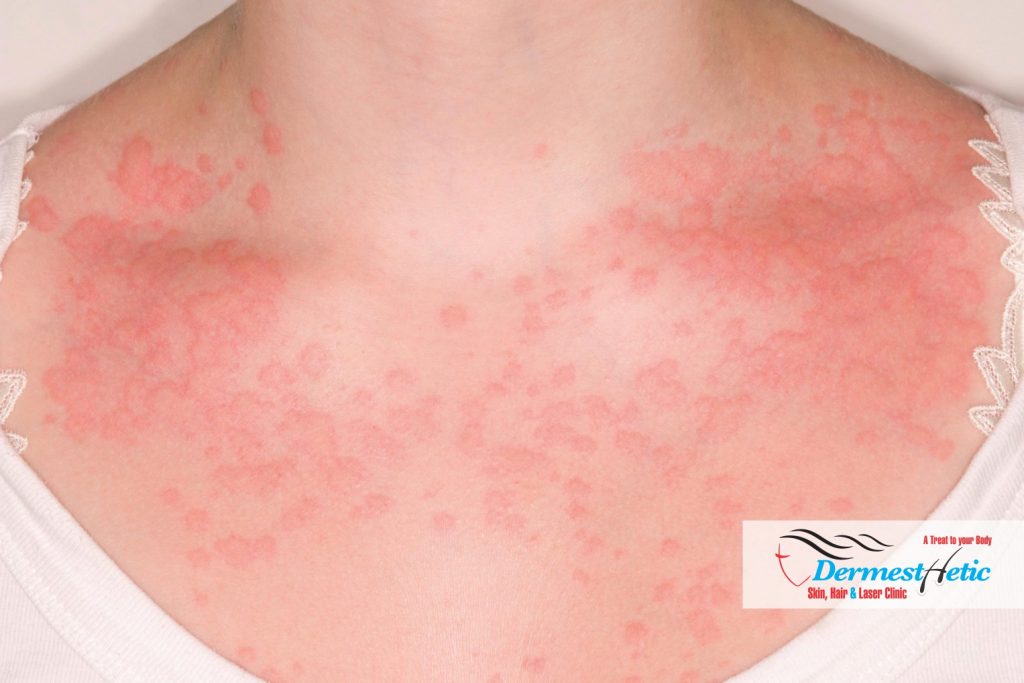
Others notice hives popping up on their skin on a more regular basis. Chronic hives may be due to an immune response, which is triggered by factors like heat, extreme exercise, or alcohol use. Stress can also cause hives, and can make hives you already have even worse. Allergic hives are usually short lived, but allergic reactions can be severe (anaphylaxis). Hives that arise due to an infection can persist for many days and will go away on its own. In rare cases, urticaria can be chronic (lasting longer than 6 weeks), and more specialist treatment might be necessary.
We at DERMESTHETIC at Silakot & Lahore, Pakistan has highly qualified Dermatologists/Cosmetologists who are expert in utricaria treatments and procedures. And don’t forget, waiting for utricaria to clear on its own can be frustrating. Without treatment, utricaria can cause low self-esteem, depression and anxiety. To avoid these possible outcomes, dermatologists recommend that people treat utricaria at an earliest stage as treatment may prevent new breakouts.
TYPES OF UTRICARIA (Hives)
We at DERMESTHETIC at Sialkot, Lahore, Pakistan have experienced dermatologists and cosmetologists treating the utricaria along with counselling on psychological issue which may crop up due to psoriasis and properly advise the patients regarding the treatment.
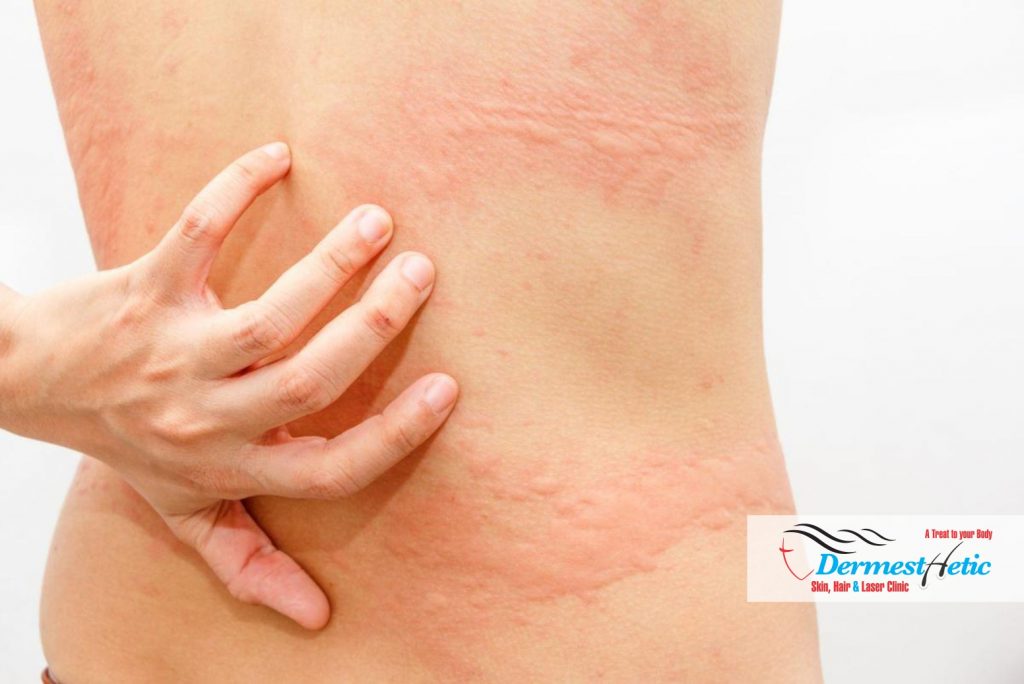
Types of utricaria include:
- Acute urticaria: These are hives that last less than 6 weeks. The most common causes are foods, medications, and infections. Insect bites and diseases may also be responsible. The most common foods that cause hives are nuts, chocolate, fish, tomatoes, eggs, fresh berries, and milk. Fresh foods cause hives more often than cooked foods. Certain food additives and preservatives may also be to blame. Drugs that can cause hives include aspirin and other nonsteroidal anti-inflammatory medications such as ibuprofen, high blood pressure drugs (especially ACE inhibitors), or painkillers such as codeine.
- Chronic urticaria: These are hives that last more than 6 weeks. The cause is usually harder to identify than those causing acute urticaria. For most people with chronic urticaria, the cause is impossible to find. In some cases, though, the cause may be thyroid disease, hepatitis, infection, or cancer. Chronic urticaria can also affect organs such as the lungs, muscles, and gastrointestinal tract. Symptoms include shortness of breath, muscle soreness, vomiting, and diarrhea.
- Physical urticaria: These hives are caused by something that stimulates the skin, for example, cold, heat, sun exposure, vibration, pressure, sweating or exercise. The hives usually occur right where the skin was stimulated and rarely appear elsewhere. Most of the hives appear within 1 hour.
- Dermatographism: This is a common form of physical urticaria where hives form after firmly stroking or scratching the skin. These hives can also occur along with other forms of urticaria.
- Solar Utricaria: This may be caused due to sun exposure to non-habituated body sites. Often spare face, neck, hands. May involve long wavelength UV or visible light.
- Cholinergic urticaria: This may be resulted due to sweat induced by exercise, sweat induced by emotional upset and hot shower.
Treatment of Urticaria (Hives)
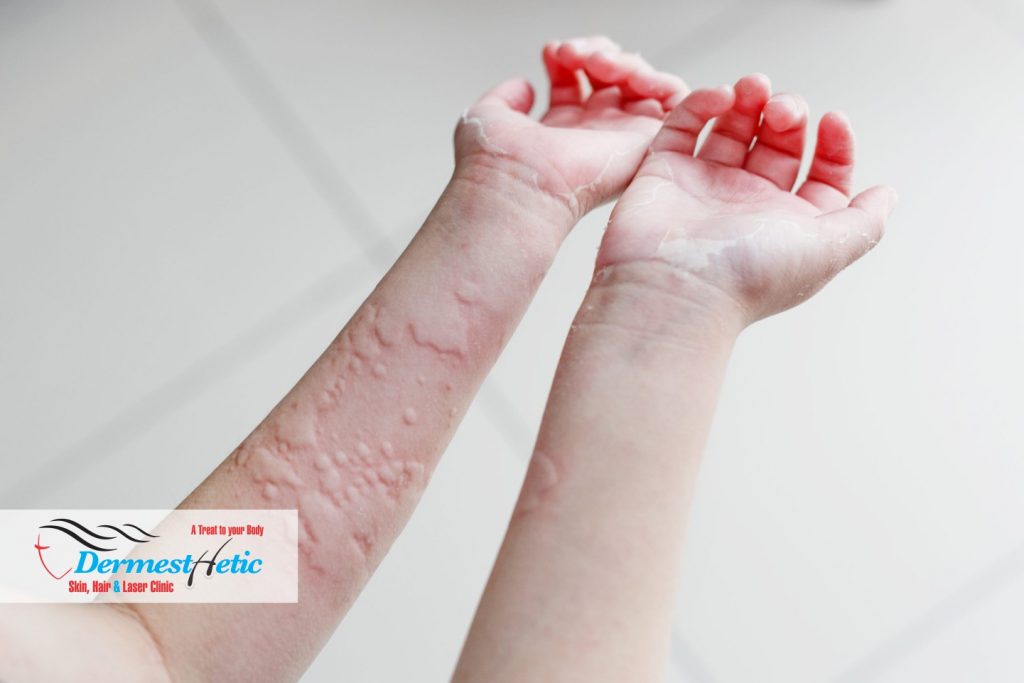
We at DERMESTHETIC at Silakot & Lahore, Pakistan have experienced dermatologists and cosmetologists treating the utricaria and properly advise the patient regarding the treatment after making proper diagnosis. Antihistamines are usually prescribed by your doctor to provide relief from symptoms. Antihistamines work best if taken on a regular schedule to prevent hives from forming in the first place. Chronic hives may be treated with antihistamines or a combination of medications.
You may want to consider avoiding the following foods that are high in histamines.
- cheese.
- yogurt.
- preserved meats.
- fruits such as strawberries and cherries.
- spinach, tomatoes, and eggplant.
- alcoholic beverages.
- fermented foods.
- fast food.
If you’re experiencing mild hives or angioedema, these tips may help relieve your symptoms:
- Avoid triggers.
- Use an over-the-counter anti-itch drug.
- Apply cold washcloth.
- Take a comfortably cool bath.
- Wear loose, smooth-textured cotton clothing.
- Avoid the sun.
- Consult your Dermatologist.
Side Effects
Hives aren’t contagious, meaning you won’t develop them on your skin by touching hives on another person. However, the trigger that causes this skin reaction can be contagious. Along with your body’s natural circadian rhythms, a number of different health conditions can cause itchy skin to become worse at night. These include: skin diseases such as atopic dermatitis (eczema), psoriasis, and hives. bugs like scabies, lice, bed bugs, and pinworms. When you’re all stressed out, your body releases hormones and other chemicals, including histamine, the powerful chemical that leads to allergy symptoms. While stress doesn’t actually cause allergies, it can make an allergic reaction worse by increasing the histamine in your bloodstream.







